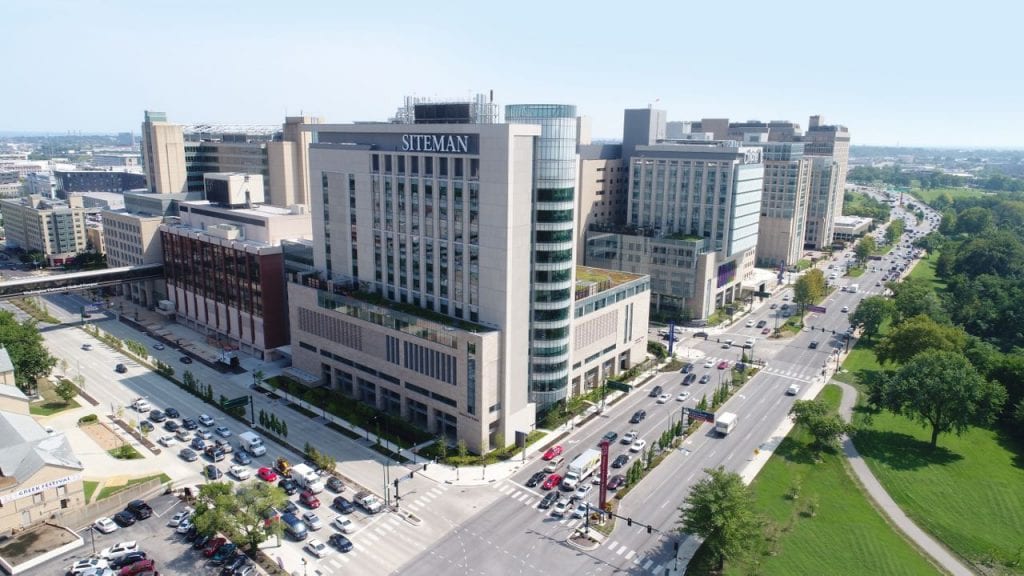Every year, the Foundation for Barnes-Jewish Hospital raises millions of dollars to support innovative research, patient care and education at the Alvin J. Siteman Cancer Center at Barnes-Jewish Hospital and Washington University School of Medicine. Those initiatives help support 75,000 patients annually. The center is a leader in treatment, research, prevention, education and community outreach, ensuring no one is alone in their fight against cancer. Each person’s experience with the disease is unique, and through groundbreaking studies and therapies, Siteman ensures their treatment is equally as personal.
Siteman is home to one of the leading neuro-oncology teams in the nation. The center’s director, Dr. Timothy J. Eberlein, notes that brain tumors are especially challenging to treat, making it a critical area for research. “Thanks to Siteman’s collaborative partnership with Washington University, we’ve been able to bring experts like neurologists, neurosurgeons, immunologists and geneticists together to solve a complex problem,” he says. “We have a world-class program dedicated to finding a cure for brain cancers as rapidly as possible.”
Research into immunology and genetics is among the work being done by Siteman’s neuro-oncology team. Dr. Gregory Zipfel, department chair of neurosurgery at Washington University School of Medicine, explains that both areas offer important insights into more effectively treating brain tumors based on the physiology of the individual. “Led by Dr. Albert Kim and Allegra Petti, Ph.D., geneticists are working to understand the epigenetic profiles of patients with malignant tumors, which could help explain why some patients don’t respond to therapy and others do,” he says. Washington University already has a leading program in immunology headed by Robert Schreiber, Ph.D., and its insights are now being applied to creating personalized vaccines and other immunotherapy approaches to brain cancer.
Siteman Cancer Center also is at the forefront of developing new ways to deliver therapies. Since brain tumors can be so difficult to treat, patients can experience harmful side effects, such as movement disorders or mood swings. Eberlein notes that many of the innovations being developed at Siteman will improve people’s outcomes and treatment experience. “It always has been difficult to target tumors and avoid normal brain tissue,” he says. “Our team is getting closer and closer to killing the cancer while sparing adjacent cells. This minimizes side effects and makes the long-term impact for patients much better.”
To allow for more targeted treatment, doctors must figure out how to get around the brain’s natural defenses, such as the blood-brain barrier. Using focused ultrasound, Washington University assistant professor of radiation oncology Hong Chen, Ph.D., has been able to temporarily break down the barrier where the tumor resides to deliver drugs and other treatments. “Along with more effectively targeted therapies, focused ultrasound can be used to perform an assisted liquid biopsy, meaning we can assess the tumor without invasive surgery,” Zipfel says. Laser interstitial thermal therapy (LITT) also is being studied as an effective treatment for tumors that are not surgically accessible. The laser not only kills tumors, but also allows for drugs to be administered that can destroy microscopic remnants of cancer cells.
Neuro-oncology is only one area where Siteman is making important research strides. The center is home to many world class programs, including innovative research in areas such as blood cancer, tumor immunology and oncology imaging. It also has resources dedicated to prevention and screening. “With lifestyle changes, 50% of cancers are preventable,” Eberlein says. “In eastern Missouri and southern Illinois, there is a higher occurrence of late stage colorectal cancer and mortality. We have developed outreach, education, screening and intervention programs to reduce those disparities.”
As one of the largest cancer centers in the country, Siteman cannot rely solely on government funding for its critical work. Philanthropic support also is equally important for research, according to Zipfel. “There is a lot of competition for large federal grants,” he explains. “Donations allow us to fully develop our ideas and create studies that are mature enough to compete.” He notes that additional funding also attracts world-class physicians and scientists to the center and helps build core resources like Siteman’s tumor bank and clinical trial infrastructure.
One of the major fundraising events that benefits Siteman Cancer Center is the Foundation for Barnes-Jewish Hospital’s Illumination Gala. Since 2007, the event has raised nearly $35 million to support research funds, including the Cancer Frontier Fund, which was created by Bill and Amy Koman to help researchers continue to make breakthroughs in cancer treatment and prevention. This year, the gala will be held virtually June 5. “Illumination has been a great success over the years,” Eberlein says. “It illustrates the wonderful partnership between the community, the Foundation for Barnes-Jewish Hospital and Siteman. We are dedicated to finding ways to improve lives and provide enormous hope to patients and their families.
The Illumination Gala benefits cancer research at the Alvin J. Siteman Cancer Center at Barnes-Jewish Hospital and Washington University School of Medicine. The event will be held virtually June 5. For more information, call 314.286.0602 or visit illuminationgala.org.
Pictured at top: Siteman Cancer Center
Photo: Courtesy of the Foundation for Barnes-Jewish Hospital
